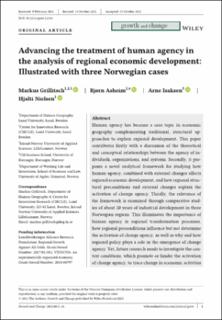Advancing the treatment of human agency in the analysis of regional economic development: Illustrated with three Norwegian cases
Peer reviewed, Journal article
Published version
Permanent lenke
https://hdl.handle.net/11250/3025069Utgivelsesdato
2021Metadata
Vis full innførselSamlinger
Originalversjon
10.1111/grow.12583Sammendrag
Human agency has become a core topic in economic geography complementing traditional, structural approaches to explain regional development. This paper contributes firstly with a discussion of the theoretical and conceptual relationships between the agency of individuals, organizations, and systems. Secondly, it proposes a novel analytical framework for studying how human agency, combined with external changes affects regional economic development, and how regionalstructural preconditions and external changes explain the activation of change agency. Thirdly, the relevance of the framework is examined through comparative studies of about 20 years of industrial development in three Norwegian regions. This illuminates the importance of human agency in regional transformation processes, how regional preconditions influence but not determine the activation of change agency, as well as why and how regional policy plays a role in the emergence of change agency. Yet, future research needs to investigate the context conditions, which promote or hinder the activation of change agency, to trace change in economic activities over time and link it to causal mechanisms, and to pay attention to the unintended consequences of change agency in the longer-term.

